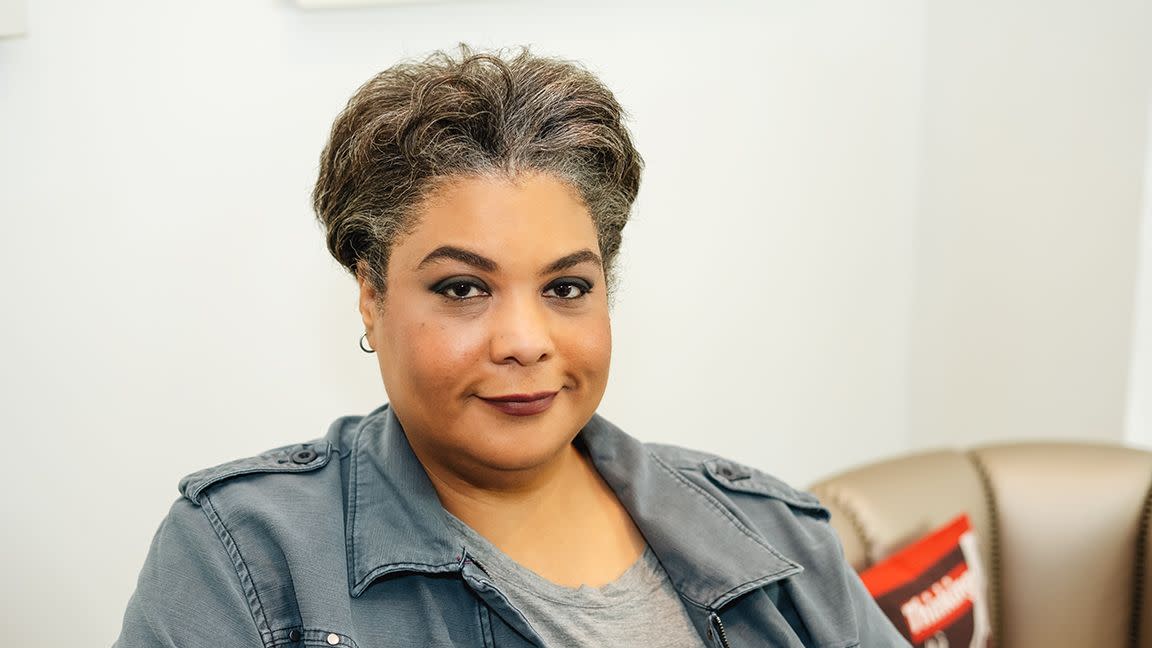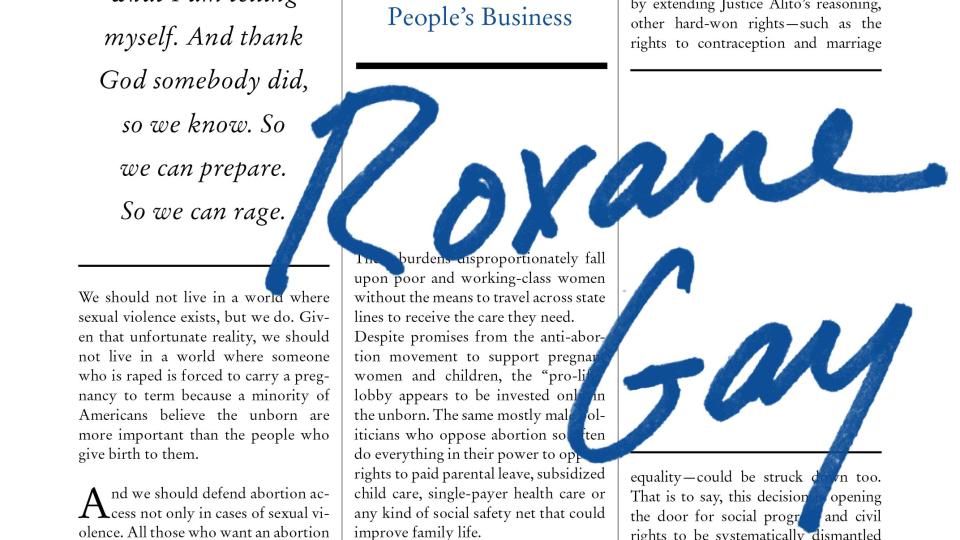Roxane Gay on Her New Book

- Oops!Something went wrong.Please try again later.
Reading Roxane Gay’s latest book, Opinions, I was struck by the fact that her career serves as a kind of secret history of the seismic shifts in media in the 21st century. Gay rose to prominence with the op-eds and short pieces she wrote for places like The Guardian and Medium—news outlets that, for a window of time in the mid-’00s to early ’10s, opened their opinion pages to voices other than the straight, white, and older ones that tended to dominate the genre. At the time, media outlets were just beginning to take digital spaces seriously, and the demand for well-written content meant that opportunities opened up for fiercely talented writers who would have been overlooked a generation before.
Gay made a name for herself with her pieces, which often turned conventional opinion writing on its head—decisive, funny takes that sat squarely in the space between logic and empathy, and eschewed conventional pundit wisdom. These pieces have been gathered in Opinions, and they showcase her work as a thinker, grappling with the questions of our time. Gay is not only an opinion writer, of course—she’s written the bestseller Bad Feminist, as well as comic books, advice columns, for television and movies, and fiction: the books Difficult Women, Ayiti and An Untamed State. Fiction, in fact, was her first foray into writing. Here, she speaks with Harper’s Bazaar about the current state of writing and her place within it.
HBZ: While I was reading these essays, I was thinking of the older economy of writing, when a major news event would happen and editors would reach out to writers to write a response as quickly as possible to post, often asking writers who shared the same identity as whoever was affected by the event to write the quickest and be the most vulnerable. But that has shifted in the last few years. Can you talk about that change in your own writing?
Roxane Gay: Anyone who writes nonfiction, who writes essays, has found that when you are first starting out, editors and publications are only really able to engage with your work in a surface manner. All they see is what they think they understand about you, which is your race, your gender, your sexuality—these, like, visible identity markers. And unfortunately, for many of these publications, that’s enough. You’re Black, therefore you’re an authority on all things Black. And that’s incredibly frustrating because that’s simply not true.
And yet you do the best you can to write with as much integrity as you can, recognizing that the system is what it is. I always just tried to write work that I would be happy to put my name on and not regret, without letting their narrow-mindedness dictate what I end up writing. And to this day, there’s nothing I’m ashamed of that I’ve ever written. When you’ve written as much as I have, that’s great.
HBZ: Is there anything you’ve published that you would want to restate or you’d want to have another crack at writing?
Roxane Gay: Oh, sure. So many of the pieces I used to write, I had to write so quickly, and there wasn’t enough time to apply as much rigor and research as I would have liked.
I don’t think that there’s been a shift in the industry. I just think that there’s been a shift in what I’m given the space to do, and now I get to take pretty much as much time as I want, for better or worse. And that helps, to be able to take time to be able to really sit with your thoughts and your opinions and figure out what do I have to say and why.

HBZ: Writing and the question of authorship face new uncertainties with the rise of AI, and recent news that your work, among many other people’s, has been used in machine learning. What do you think about the future of writing in this landscape?
Roxane Gay: You know, I don’t fully understand AI, yet I recognize that it’s here. I think that this is not going to be the final iteration of AI. There are going to be quite a lot of lawsuits, and it’s kind of gonna go the way of NFTs, and then someone’s (finally) gonna figure it out correctly and it will come back.
When it comes to creative writing, I’m always just mystified by people who are really excited about it, because the whole point of creative writing is that we are the AI, we are the people who are making things up, or narrating our lives, or engaging in cultural commentary. The idea that we would want to outsource some of that creative labor is something that I find completely baffling.
And so when I see my books in the database of, you know, whose work has been used to train AI, it’s frustrating. I don’t think I’m taking it as emotionally as some writers are, because books get pirated all the time. But I do think it’s very interesting to see just how many books have been used—100,000! It speaks to [the] audacity [of some of these companies] … It’s not like they’re doing this for the greater good of humanity. They’re not—they’re doing it for the greater good of their financial bottom lines. I wish we could get that creative and exploit our own creativity for some kind of profit. But we’re not there yet for most of us.
This book also struck me as a kind of lesson in what it means to make a life for oneself as an artist and a thinker. You are six books in, and you are still working and coming up with ways to express yourself.
Roxane Gay: One of the key things I think is that I’m the child of immigrants. And so I never thought I could make a living as a writer. That was never an option. That’s not a fantasy I entertained at all. And when I dare entertain it, I would just be like, Girl, wake the fuck up. I always had a day job. It’s just so hard to talk about these things, because people are going to take it 5,000 different ways. But I’ve always had a day job, and I have not necessarily made that much money. I mean, I taught English at a regional state university. My salary was not great, but it was good enough, and then it got a little better and a little better.
What has allowed me to sustain a creative career has been a little bit of security and knowing that when I am not able to produce as much for whatever reason, it will be okay, because that is not what is paying my bills. That sort of financial stability I find to be very helpful for creativity. I personally don’t do well when I’m working two or three, not two or 33 or four, jobs. I just like knowing that I can support myself and take care of my family and all of the other things I have to do. And that is not contingent on my creativity.
I also have been very omnivorous as a writer. I love just trying new things. You just don’t necessarily know what I’m gonna do from one book to the next or one essay to the next. I mean, I can say yes too much, but I get to say yes to truly exciting things, and I love learning how to work in a new genre. And that really keeps me engaged and excited, and I feel very lucky to be able to do the kinds of things that I’ve been able to do in recent years. It’s just so thrilling. And that really, really helps. You know, I love what I do.
You Might Also Like

